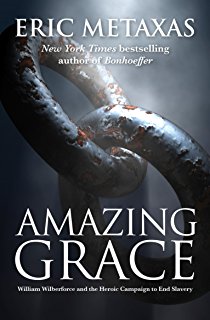The subtitle of this book is William Wilberforce And The Heroic
Campaign To End Slavery.

Amazing Grace tells the story of the remarkable life of the British abolitionist William Wilberforce (1759-1833). This accessible biography chronicles Wilberforce’s extraordinary role as a human rights activist, cultural reformer, and member of Parliament.
At the center of this heroic life was a passionate twenty-year fight to abolish the British slave trade, a battle Wilberforce won in 1807, as well as efforts to abolish slavery itself in the British colonies, a victory achieved just three days before his death in 1833.
His conversion, described as The Great Change, occurred while he was wrestling with the moral dilemmas of the 18th century’s ‘civilized’ society. Religion had become empty with outward trappings but no real power or sincerity.
